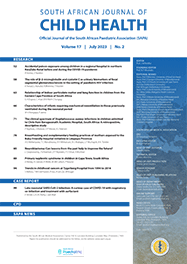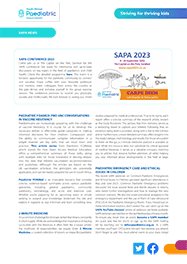Articles

Neurodevelopmental status of HIV-exposed but uninfected children: A pilot study
Abstract
Objectives. To compare the developmental outcome of infants exposed to HIV in utero who remained uninfected (HEU) with that of infants unexposed to HIV in utero (HUU).
Methodology. This was a prospective, blinded, hospital-based study. Infants aged between 17 and 19 months were assessed on the Griffiths Mental Developmental Scales (GMDS). Birth history, previous hospitalisation, maternal and infant characteristics, antiretroviral exposure, anthropometric measurements and abnormal clinical findings were documented.
Results. Of the original 55 infants enrolled at 2 weeks of age, 37 (17 HEU and 20 HUU) underwent neurological and developmental assessment. There were no significant differences between the groups with regard to the GMDS general quotient or other subscales, apart from the Personal/social subscale, where the HEU group performed significantly more poorly than the HUU participants (p=0.026). This difference is probably a result of cultural differences between the groups, as 76% of HEU and only 15% of HUU participants were of Xhosa origin.
Discussion. There was no difference in neurodevelopmental outcome at 18 months between the HEU and HUU groups.
Authors' affiliations
P Springer, Department of Paediatrics and Child Health, Tygerberg Children’s Hospital and Faculty of Health Sciences, Stellenbosch University, Western Cape
B Laughton, Department of Paediatrics and Child Health, Tygerberg Children’s Hospital and Faculty of Health Sciences, Stellenbosch University, Western Cape
M Tomlinson, Department of Psychology, Faculty of Health Sciences, Stellenbosch University, Western Cape
J Harvey, Centre for Statistical Consultation, Stellenbosch University, Western Cape
M Esser, Department of Pathology, Immunology Unit, Division of Medical Microbiology, National Health Laboratory Service, Stellenbosch University, Tygerberg, Western Cape
Keywords
Cite this article
Article History
Date published: 2012-03-29
Article Views
Full text views: 6780

.jpg)



Comments on this article
*Read our policy for posting comments here